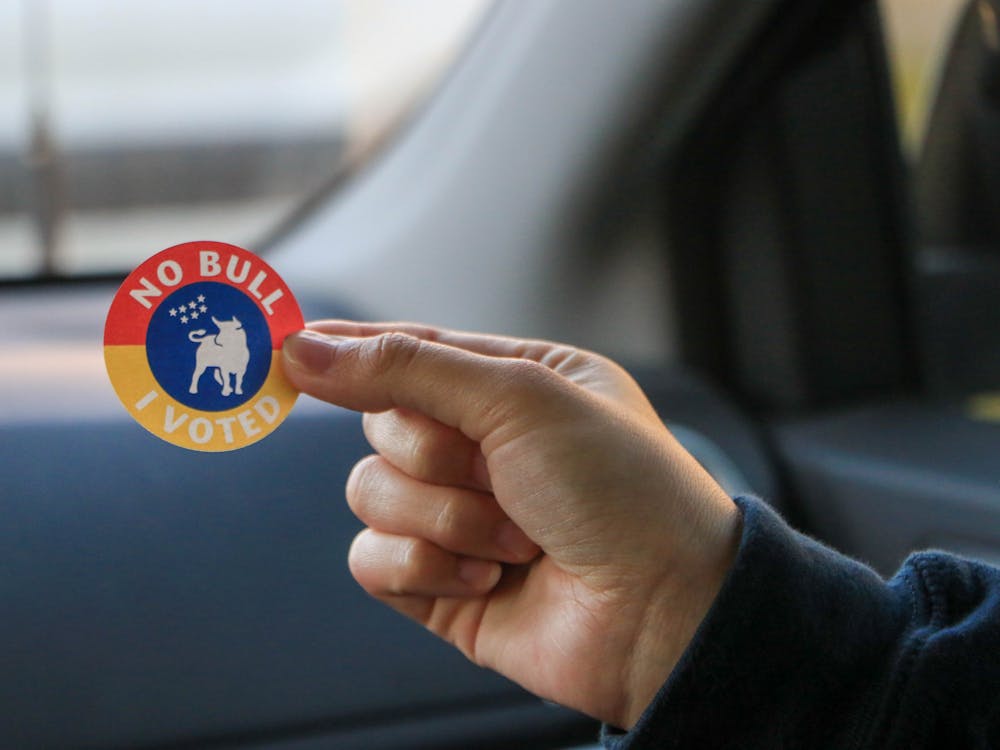Durhamites will cast votes for three City Council members and their next mayor Tuesday, choosing among top candidates from the Oct. 10 primaries.
Current council member Leonardo Williams and state Sen. Mike Woodard are the two candidates on the Durham mayoral ballot.
Five candidates are competing for three council seats: Nate Baker, Javiera Caballero, Monique Holsey-Hyman, Khalilah Karim and Carl Rist.
Before you cast your votes, The Chronicle has compiled a guide to the candidates’ stances on Durham’s most pressing issues.
The housing crisis
As one of the fastest-growing cities in the nation, Durham has faced housing pressure spurred by high housing prices and the displacement of low-income residents.
Mayoral candidates Woodard and Williams both cited this crisis as a major element of their platforms and have broad visions of implementing affordable housing solutions and development.
In particular, Williams plans to target eviction issues by investing in the Evictions Diversion Program, which provides legal representation to low-income residents and high-risk homeowners. He also hopes to partner with Durham Housing Authority to ensure the safety of public housing, as well as support tenants who are transitioning from public housing to independent ownership and rental properties.
All six council candidates proposed varying solutions to the housing crisis.
Rist and Caballero plan on approving a new affordable housing bond plan to help finance low-interest mortgages for low-income homebuyers.
Caballero hopes to dedicate housing bond resources to redevelop McDougald Terrace, the largest public housing community in Durham, while Rist considers supporting senior residents and nonprofit affordable development.
Baker is the sole candidate who mentioned strengthening the Tenant’s Bill of Rights, which includes creating a new committee for tenants' rights and a tenant’s union. He also plans on providing affordable housing that assists those around the median household income, a sentiment shared by Karim.
Caballero, Karim and Holsey-Hyman mentioned strengthening Durham’s Eviction Diversion Program, which offers legal representation for Durham residents facing eviction.
In terms of the growing homelessness epidemic, Holsey-Hyman and Caballero plan on creating day shelters in collaboration with Durham County.
Community safety
Durham ranked 14th in the nation for homicides in the first quarter of 2023, with 4.66 homicides per 100,000 people.
Williams, Baker, Caballero, Karim, Holsey-Hyman and Rist discussed further investment in Durham’s Holistic Empathetic Assistance Response Teams program, which dispatches social workers or peer support specialists in response to certain 911 calls instead of the police.
Williams also said he intends to curtail crime among young men of color by expanding the Community Safety Wellness Task Force, which looks for alternatives to the policing and criminal legal system.
Woodard, Williams’ opponent in the mayoral race, wants to address staffing shortages at 911 call centers. Baker, Holsey-Hyman and Rist also look to address vacancies in public service departments and pay emergency responders competitive wages.
Baker, Caballero and Holsey-Hyman spoke about preventing crime by investing in youth services and mental health programs. Karim discussed investing in Durham’s most marginalized communities as a “systemic solution” for violent crime.
Get The Chronicle straight to your inbox
Sign up for our weekly newsletter. Cancel at any time.
Baker also plans to invest in other “long-term” solutions to crime including affordable housing, criminal justice reform and parks and recreation.
Caballero hopes to lower Durham police officers’ workloads by creating a civilian traffic unit in the Community Safety Department, which would lower the police workload.
The economy
Supporting Durham’s local economy is at the forefront of many candidates’ platforms.
Williams and Woodard hope to raise Durham’s minimum wage, while Baker, Caballero, Karim and Rist look to assess and expand the number of living-wage jobs.
Williams aims to partner with local businesses, entrepreneurs and companies to develop apprenticeship programs for youth of color and hopes to build collective funds such as the Durham Small Business Relief Fund. He also looks to provide guaranteed basic income and increase opportunities for businesses to provide healthcare for youth of color.
In addition to raising minimum wages, Woodard plans to build Durham's economy by providing affordable housing and by supporting prospective homebuyers.
As a council member, Baker hopes to find creative revenue options, such as ensuring that new development covers its costs, tax increment financing and exploring payment-in-lieu of taxes for Duke and Duke Health.
In addition to implementing cost-of-living increases for all city workers and contractors, Caballero said she plans to continue to expand the efforts of the City of Durham’s Office of Economic and Workforce to support Latino and other immigrant-owned businesses while in office. Caballero would also propose the construction of a larger Convention Center to increase city revenue and reduce reliance on property taxes.
If elected, Karim plans to increase investment into eviction diversion, permanent affordable housing and homeownership, as well as support efforts to create more union jobs and basic income opportunities.
In addition to advocating for the expansion of living-wage jobs, Rist said he will add investments into education and training to address the skills gap. Rist also plans to invest in wealth-building so that all households have the opportunity to cultivate homes, small businesses and higher education.

Ishani Raha is a Pratt junior and a senior editor of The Chronicle's 119th volume.
Mia Penner is a Trinity junior and an audience engagement editor of The Chronicle's 120th volume.

Andrew Bae is a Trinity junior and an editor-at-large of The Chronicle's 120th volume.

